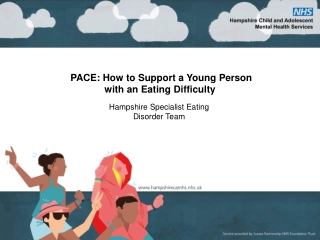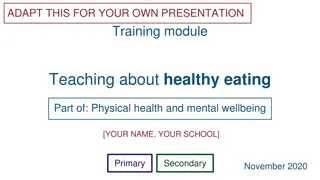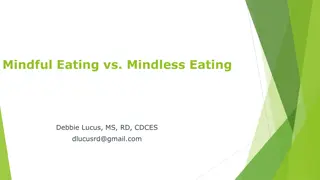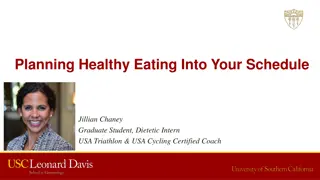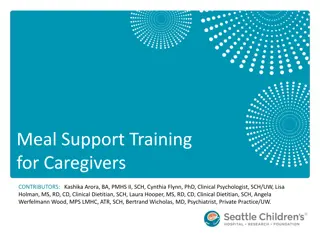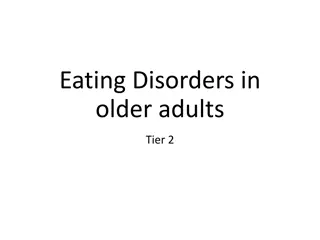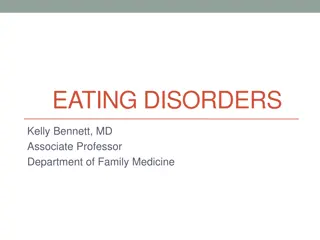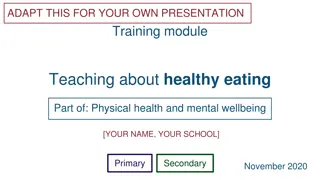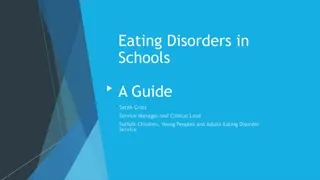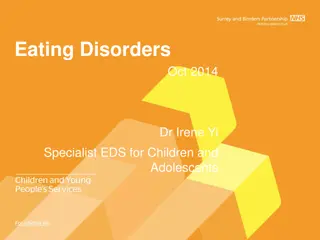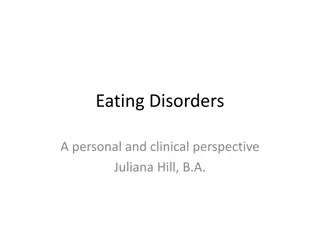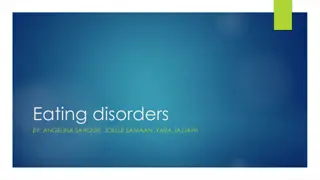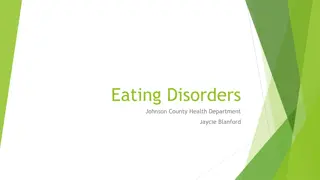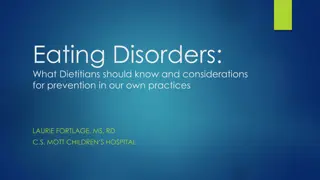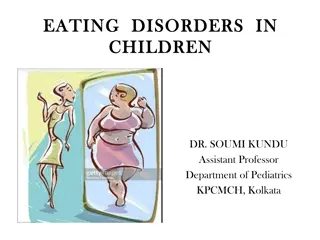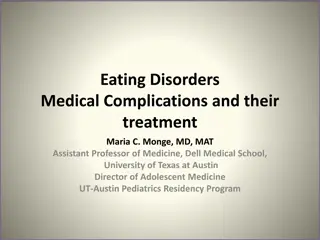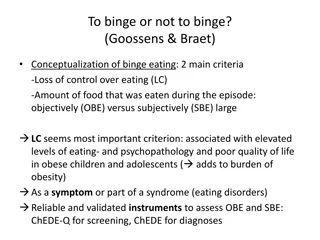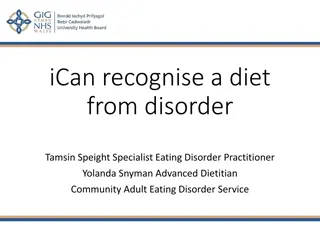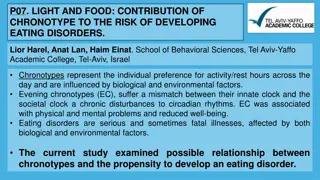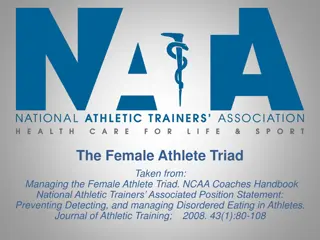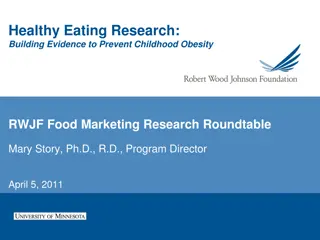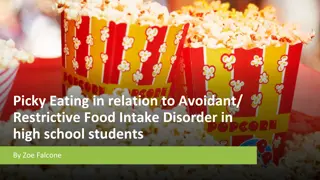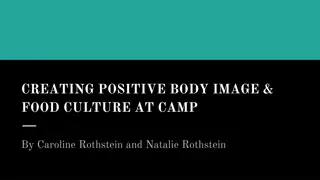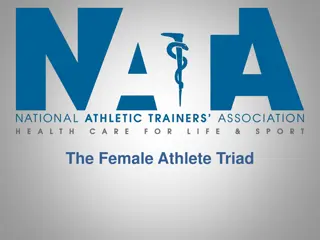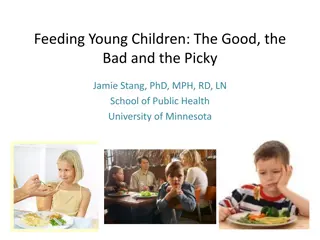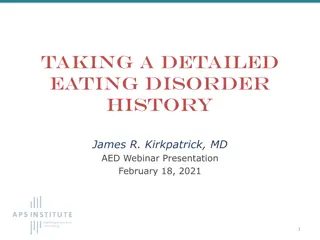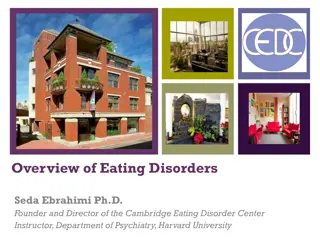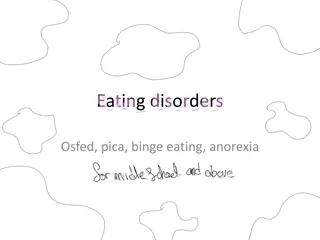Supporting Young People with Eating Difficulties
Learn how to provide effective support for young individuals facing eating challenges. Insights from Hampshire Specialist Eating Disorder Team.
1 views • 20 slides
EXERCISE ADDICTION AND DISORDERED EATING IN ADOLESCENTS
A study led by Dr. Mia Beck Lichtenstein introduces the Exercise Addiction Inventory for Youth (EAI-Y) to assess exercise addiction in adolescents, particularly those with disordered eating. The research aimed to validate the EAI-Y, estimate the prevalence of exercise addiction in active adolescents
2 views • 10 slides
Stress Eating and Resources for PATHWEIGH May 5
Dr. Liz Chamberlain discusses stress eating strategies, focusing on why people eat when stressed, mindfulness techniques to handle food cravings, identifying habits and rewards related to eating, and practicing the HALT method to manage cravings effectively. She emphasizes curiosity, mindfulness, an
1 views • 12 slides
Nutritious Delights: Embrace a Healthier Lifestyle Today!
Dive into the world of healthy eating with "Nutritious Delights: Embrace a Healthier Lifestyle Today!" Discover the benefits of consuming healthy foods - from enhancing cognitive function to promoting happiness. Engage with compelling visuals and an informative video showcasing the advantages of a b
0 views • 7 slides
Teaching Healthy Eating for Physical Health and Wellbeing
This training module focuses on teaching about healthy eating as part of physical health and mental wellbeing in primary and secondary schools. It provides guidance on the new curriculum, strategies for teaching, and related topics such as design and technology and science. Educators will gain confi
0 views • 99 slides
Promoting Healthy Eating with the SMILE Project
The SMILE project is a school initiative aimed at promoting healthy eating habits among KS1 children by encouraging them to make healthier food choices and understand age-appropriate portion sizes. By replacing traditional meal trays with SMILE trays and providing education on nutrition, the project
0 views • 10 slides
The Importance of Healthy Eating for Mental Well-Being
Eating well plays a crucial role in maintaining mental health. Nutrient-dense foods can improve mood, cognitive function, and energy levels. Building healthy eating habits, identifying barriers, and addressing emotional eating are keys to achieving overall well-being.
0 views • 11 slides
Insights into Mindful vs. Mindless Eating Behaviors
Understanding the contrast between mindful and mindless eating through real-life scenarios and experiments reveals how external cues, portion sizes, and presentation influence our eating habits and perception of food. From unknowingly refilling soup bowls to pouring more liquid into certain glass sh
0 views • 25 slides
Tips for Incorporating Healthy Eating into a Busy Lifestyle
Factors influencing healthy choices include taste, time, and total cost. Debunking myths, eating healthy doesn't have to be bland or time-consuming. Practical tips for healthy eating in and out, emphasizing balance and informed choices. Eating healthy can be budget-friendly with smart decisions and
2 views • 15 slides
Essential Meal Support Training for Caregivers of Individuals with Eating Disorders
Comprehensive meal support training program for caregivers of individuals with eating disorders. Contributors include professionals in psychology, dietetics, and psychiatry. Covered topics include treatment basics, family-based approaches, caregiver expectations, and modeling healthy eating behavior
0 views • 56 slides
Understanding Eating Disorders in Older Adults
Eating disorders can affect older adults too, yet they are often overlooked or misdiagnosed. Challenges in diagnosing these disorders arise from various underlying health conditions. Types of eating disorders include anorexia nervosa, bulimia nervosa, binge eating disorder, and others. Recognizing c
0 views • 7 slides
Understanding Eating Disorders: Diagnostic Criteria, Signs, and Treatments
This presentation covers the diagnostic criteria, signs, and treatments for anorexia nervosa, bulimia nervosa, and binge-eating disorder. It details the subtypes, severity levels, prevalence, development, courses, and risk factors associated with eating disorders, providing a comprehensive overview
0 views • 32 slides
Training Module on Teaching Healthy Eating for Physical and Mental Wellbeing
This training module focuses on teaching healthy eating to promote physical health and mental wellbeing in primary and secondary schools. Subject leads can utilize the slides, activities, and templates provided to enhance teachers' training sessions. By the end of this training, participants will be
0 views • 99 slides
Understanding Eating Disorders: Types, Signs, Effects, and Recovery
Eating disorders are mental disorders characterized by unhealthy eating habits and can have severe physical and psychological consequences. This article explores the definition of eating disorders, signs to look out for, different types such as Anorexia Nervosa, Bulimia Nervosa, Pica, and Purging Di
0 views • 10 slides
Understanding Eating Disorders in Schools: A Comprehensive Guide
This guide sheds light on the alarming increase in eating disorder referrals since March 2020, especially among young individuals. It explores the impact of lockdown on behaviors, provides insights into diagnostic features, behavioral indicators, and discusses ARFID. Early intervention is crucial fo
0 views • 10 slides
Understanding Eating Disorders in Children and Adolescents: Insights from Dr. Irene Yi
This comprehensive presentation by Dr. Irene Yi delves into eating disorders, including Anorexia Nervosa and Bulimia, in children and adolescents. The content covers types of eating disorders, developmental perspectives, assessment stages, and management strategies. NICE guidelines for managing eati
0 views • 25 slides
Understanding Eating Disorders: A Personal and Clinical Perspective
This insightful content delves into eating disorders from a personal narrative and clinical standpoint, covering Anorexia Nervosa, Bulimia Nervosa, and Eating Disorder Not Otherwise Specified (EDNOS). It provides criteria for each disorder, facts, and statistics, shedding light on the challenges, im
1 views • 15 slides
Understanding Eating Disorders: Types, Signs, and Recovery
Eating disorders are mental disorders characterized by unusual eating habits that can negatively impact physical and mental health. They manifest in various forms such as anorexia nervosa, bulimia nervosa, pica, and purging disorder. Recognizing signs like changes in weight, body image obsession, an
0 views • 6 slides
Understanding Eating Disorders in Older Adults
Eating disorders in older adults can have serious physical and mental health consequences. Recognizing symptoms such as weight loss, phobia, and vomiting is crucial. Treatment is available, and it's important to differentiate between eating disorders and other causes of weight loss in older adults t
0 views • 10 slides
Understanding Eating Disorders: Insights and Treatments
Body dissatisfaction is prevalent in both men and women, leading to the development of eating disorders like anorexia nervosa and bulimia nervosa. Anorexia nervosa is characterized by restricted food intake and intense fear of weight gain, while bulimia nervosa involves binge eating and purging beha
0 views • 13 slides
Understanding Eating Disorders: Insights for Dietitians
Eating disorders are complex neurobiological conditions that are not merely about control or weight management. These disorders can affect individuals of all genders, body sizes, and socioeconomic backgrounds. Dietitians play a crucial role in identifying, assessing, and treating eating disorders, a
0 views • 41 slides
CBT-E Assisted Eating at HFU: Strategies and Techniques
Assisted eating aims to help patients apply cognitive behavioral strategies during meals by addressing their difficulties and formulating a recovery mindset. Through open questions, problem identification, exploration, education, and practicing alternative mindsets, individuals can actively engage i
0 views • 7 slides
Understanding Eating Disorders in Children by Dr. Soumi Kundu
Eating disorders in children, such as anorexia nervosa, bulimia nervosa, and binge eating disorder, are complex biopsychosocial disorders characterized by dysfunctional patterns of cognition and weight control behaviors. They result in significant physical, psychological, and social complications. T
0 views • 34 slides
Understanding Eating Disorders: Medical Complications and Treatment
This presentation by Dr. Maria C. Monge covers the common eating disorders in teenage patients, potential medical complications, and the role of the medical team in treatment. It includes definitions of disorders like Anorexia Nervosa, Bulimia Nervosa, and Binge Eating Disorder according to DSM-5 cr
0 views • 60 slides
Understanding Binge Eating in Children and Adolescents: Implications for Obesity Practitioners
Conceptualizing binge eating in young individuals involves criteria like loss of control over eating and the amount of food consumed. The prevalence of binge eating varies based on definitions and assessment methods, with non-treatment seekers showing lower rates than treatment seekers. The developm
0 views • 5 slides
Understanding Eating Disorders: Types, Signs, and Support
Eating disorders encompass unhealthy attitudes towards food and body image, affecting individuals' physical and mental well-being. Types such as anorexia nervosa, bulimia, binge eating disorder, and OSFED are discussed, along with the emotional aspects of these conditions. Recognizing signs, seeking
0 views • 45 slides
Impact of Chronotype on Developing Eating Disorders
Chronotypes, representing individuals' morningness-eveningness preference, play a significant role in the propensity to develop eating disorders. Evening chronotypes, facing a mismatch between their internal clock and societal demands, have been linked to various health and mental health issues. A s
0 views • 5 slides
Recognizing and Managing the Female Athlete Triad: Coaches' Role
The Female Athlete Triad encompasses disordered eating, amenorrhea, and osteoporosis. Coaches play a vital role in recognizing and addressing disordered eating in athletes. This condition ranges from simple dieting to clinical eating disorders, impacting performance and health. Understanding the sig
0 views • 9 slides
Healthy Eating Research Program Overview and Impact
Healthy Eating Research Program, launched in 2005, focuses on preventing childhood obesity by targeting children, adolescents, and families. The program aims to establish a research base on factors influencing healthy eating and body weight in children, build a multidisciplinary research field, and
0 views • 10 slides
The Link Between Picky Eating and Avoidant/Restrictive Food Intake Disorder in High School Students
Picky eating behaviors in children can potentially lead to Avoidant/Restrictive Food Intake Disorder (ARFID) if not outgrown by age 6. Research indicates that parental pressure, aversive experiences, and specific eating characteristics are associated with picky eating tendencies that may predict ARF
0 views • 16 slides
Exploring Positive Body Image and Food Culture at Camp
Explore themes surrounding body image and food culture at camp, understanding how these impact campers and staff. Learn to make positive shifts in camp culture, addressing disordered eating and emotional eating. Discover the intersection of food and body image, challenges faced, promoting body posit
0 views • 15 slides
Understanding the Female Athlete Triad: Disordered Eating, Amenorrhea, Osteoporosis
The Female Athlete Triad encompasses disordered eating, amenorrhea, and osteoporosis, posing serious risks to athletes. Disordered eating behaviors range from simple dieting to clinical eating disorders, impacting the athlete's health and performance. Coaches play a crucial role in recognizing signs
0 views • 10 slides
Understanding Children's Eating Behavior and Taste Preferences
This presentation delves into common eating behaviors and challenges in young children, including the development of taste preferences. It highlights the impact of prenatal and early childhood exposures on food acceptance, discusses the role of parental feeding practices, and emphasizes the importan
0 views • 27 slides
Understanding Eating Disorders: Key Insights from Dr. James R. Kirkpatrick, MD
Dr. James R. Kirkpatrick, MD, a renowned expert in eating disorders, shares valuable insights in a webinar presentation. He emphasizes the importance of taking a detailed eating disorder history, provides reasons for initial interviews, and highlights motivations for engaging in eating disorders. Th
0 views • 79 slides
Understanding Eating Disorders: Overview, Prevalence, and Types
This detailed information covers the prevalence of eating disorders in the U.S., including statistics on anorexia, bulimia, and binge eating disorder. It also delves into the impact of eating disorders on children and adolescents, highlighting disturbing trends in body image and obesity rates. Addit
0 views • 30 slides
Understanding and Addressing Problematic Eating Behaviors
Explore the prevalence and impact of eating disorders in different populations, and learn about ACT interventions for problematic eating behaviors and body image concerns. Discover key statistics, such as rates of ED diagnoses, correlations with mental health issues, and common comorbid disorders as
0 views • 27 slides
Understanding and Preventing Obesity: A Guide to Healthier Living
Obesity is a social problem that can have significant impacts on both physical and mental health. This article discusses the definition of obesity, its social consequences, and practical tips on how to prevent it through healthier food choices, increased physical activity, and awareness of the conse
0 views • 9 slides
Understanding Eating Disorders: Types, Causes, and Treatment Options
Eating disorders such as OSFED, pica, binge eating, and anorexia are significant conditions that impact health, emotions, and daily functions. They are characterized by persistent detrimental eating patterns. Treatment for OSFED is individualized and can include evidence-based therapies. Binge eatin
0 views • 16 slides
USDA New Meal Pattern Guidelines Implementation Overview
The USDA has introduced new meal pattern guidelines effective from October 1, 2017, impacting various food components like Vegetables and Fruits, Grains, Meat and Meat Alternatives, Fluid Milk, Food Preparation, and Additional Provisions. The guidelines aim to promote healthier eating habits by rest
0 views • 10 slides
Eating Disorders Treatment in the UK
Eating disorders encompass a range of conditions characterized by unhealthy eating habits and preoccupation with food, body weight, and shape. Common types include anorexia nervosa, bulimia nervosa, and binge eating disorder. These conditions often a
2 views • 6 slides
